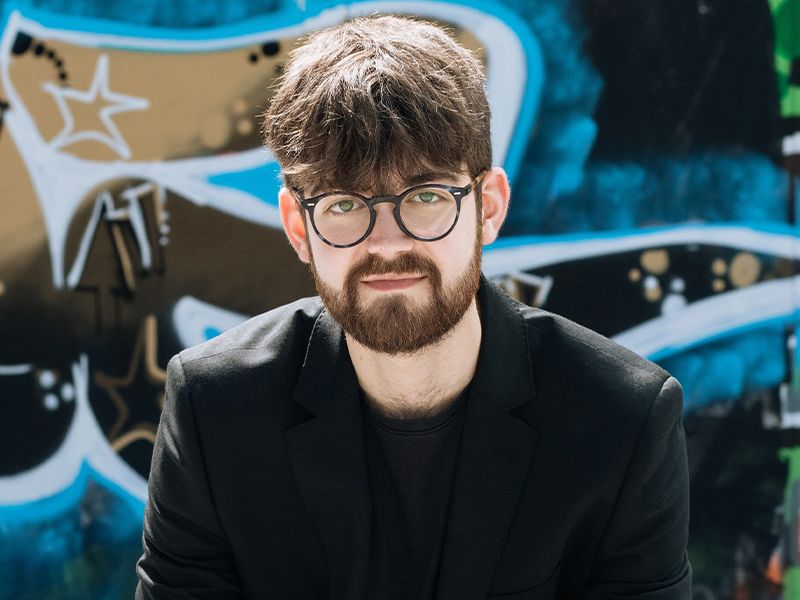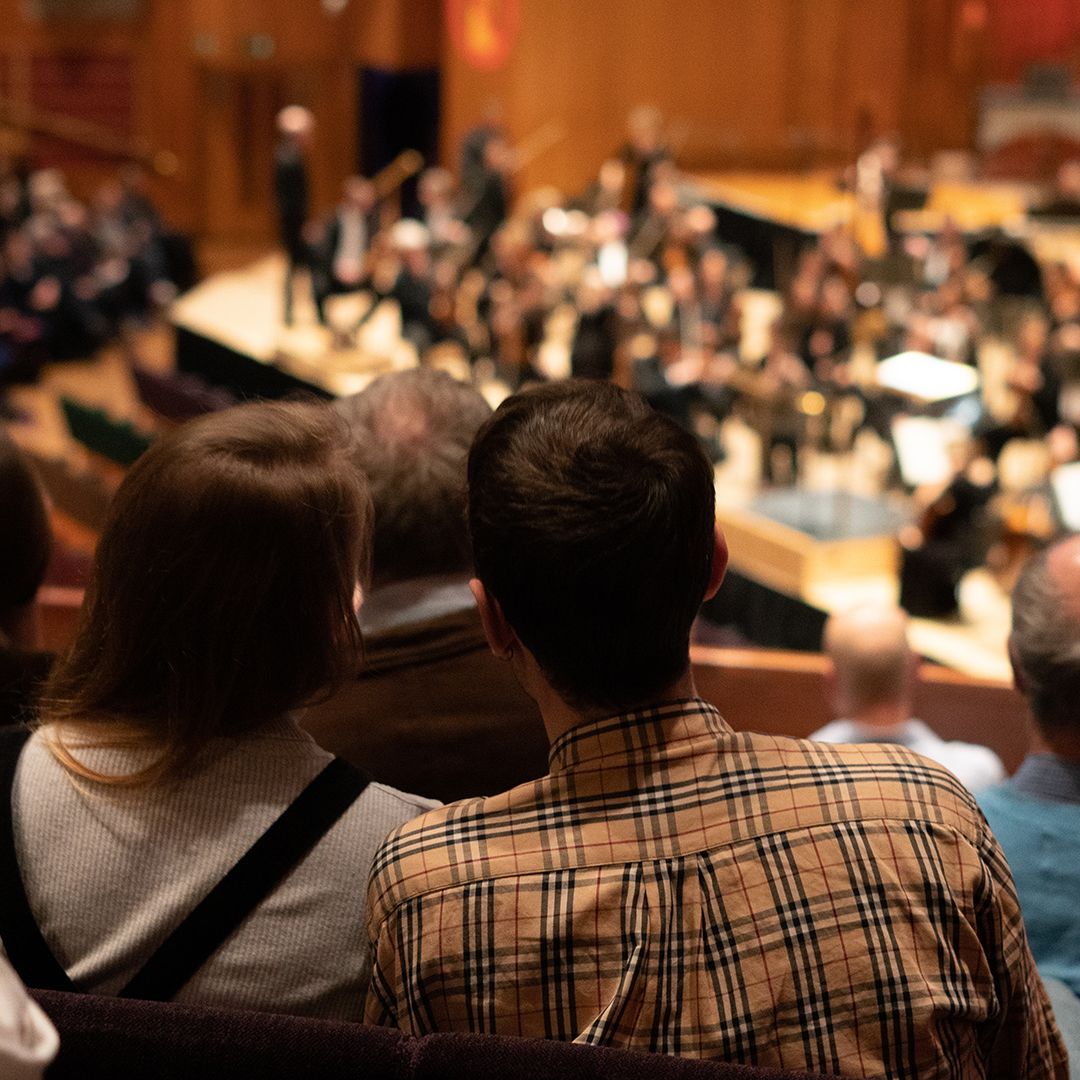LSO Discovery
Friday
Lunchtime Concert
Friday 21 January 2022 12.30pm

Welcome to LSO St Luke's and this Free Friday Lunchtime Concert.
YOUR DIGITAL CONCERT GUIDE
You can use your phone to view this digital guide during the concert, and discover more about the music and performers.
Navigate using the menu icon (≡) at the top of the screen.

There is free WiFi available in the Jerwood Hall. Connect to the 'hawksmoor' network.
So that everyone can have the best experience, please set your phone to silent and only use it during the performance to read these notes. Photos can be taken during applause at the end of the concert.
Today's Programme
J S Bach Prelude and Fugue in E-flat major BWV876
Fanny Mendelssohn First movement from 'Easter Sonata'
Ludwig van Beethoven Bagatelle No 6 in E-flat major Op 126
Franz Liszt Sonetto 123 del Petrarca from ‘Années de pèlerinage, Deuxième année: Italie’
Fritz Kreisler arr Serge Rachmaninoff Liebesleid
Wililam Bracken piano
Rachel Leach presenter
J S Bach (1685–1750)
Prelude and Fugue in
E-flat major BWV876
✒️ 1740 | ⏰4 minutes

Johannes Sebastian Bach is now regarded as the composer who influenced all who followed, but in his lifetime he was merely a jobbing musician moving from job to job as music master to a series of wealthy families. In this role he had to provide music for the weekly church services, for entertainment and for celebration, and he therefore churned out a huge amount of music. In 1722 and 1742 Bach wrote The Well-Tempered Clavier – two sets of 24 Preludes and Fugues, one in each major and minor key. Bach wrote his pieces ‘for the profit and use of musical youth desirous of learning and especially for the pastime of those already skilled in this study'. They are now considered one of the most important musical works of all time.
Note by Rachel Leach
Fanny Mendelssohn (1805–47)
First movement
from 'Easter Sonata'
✒️ 1828 | ⏰6 minutes

1 Largo e molto espressivo
The oldest of the four Mendelssohn children, Fanny, was the first to display any interest or talent in music. She was taught piano by her mother and was able to play all of Bach’s 24 Preludes and Fugues by the age of just 13. She wrote music throughout her life, amassing more than 460 works mostly for piano or voice, but it was not socially acceptable for women to publish music in the 1800s and her father was very much against it. This Sonata in A major was written around Easter in 1828. Fanny spoke of its composition in her letters, but the work wasn’t published and the manuscript was lost. It was found in France 150 years later and immediately attributed to her brother, Felix Mendelssohn. It then took until 2012 for it to be performed rightfully attributed to Fanny. The opening movement starts with a very simple melody that quickly grows in complexity and passion.
Note by Rachel Leach
Ludwig van Beethoven (1770–1827)
Bagatelle No 6 in E-flat major Op 126
✒️ 1825 | ⏰4 minutes

Ludwig van Beethoven was in appearance and manner a very unlikely genius. He was often dirty, dishevelled, aggressive and eccentric, but his music radically transformed every genre he wrote in. Tragedy struck at the age of 28 when he began to go deaf and soon could only communicate using a notebook. He only heard his greatest works by imagining the sounds in his head. As well as being one of the finest composers who ever lived, Beethoven was an exceptionally gifted pianist and wrote much for the instrument. A ‘bagatelle’ is a short, characterful piece. This one is part of a set written towards the end of Beethoven’s career and dedicated to his brother Nikolaus. No 6 is the finale of the set and shares a similarity with another great work Beethoven was composing at the time, his mighty Ninth 'Choral' Symphony – both pieces begin with a slightly chaotic flurry of notes.
Note by Rachel Leach
Franz Liszt (1811–86)
Sonetto 123 del Petrarca from ‘Années de pèlerinage, Deuxième année: Italie’
✒️ 1839 | ⏰7 minutes

Franz Liszt was the first superstar musician. He was famous all over Europe as a great pianist and women in particular would flock to see his performances, desperate for a small souvenir from the hugely attractive star. He retired from performing at just 35 to concentrate on his composing career and wrote hundreds of incredible works in all genres. His true masterpieces are, of course, for piano. This gorgeous, gentle work is from a suite of pieces written around 1839, inspired by travels around Italy. Francesco Petrarca (whose name is in the title) was a scholar and poet from early-Renaissance Italy, and this is a setting of his Sonnet 123 which talks of ‘seeing angels, their eyes like the sun, who made a sound full of love and sorrow, and who caused a storm, but no leaves moved upon the trees’. Liszt perfectly encapsulates these words with his music.
Note by Rachel Leach
Fritz Kreisler (1875–1962)
arr Serge Rachmaninoff (1873–1943)
Liebesleid
✒️ 1931 | ⏰4 minutes

The last of the great romantic composers, Serge Rachmaninoff was really quite behind the times. He was writing music of unparalleled feeling and pathos during a time of musical revolution with the 12-note system and atonalism challenging all that preceded it. The audiences loved him, but the critics were often scathing in their reviews of his work. It is undeniable however that Rachmaninoff was a truly great pianist, perhaps the greatest of all time. Liebesleid (Love’s Sorrow) is one of three short pieces written by Rachmaninoff’s friend, the great violinist Fritz Kreisler. Published in 1905 under a pseudonym, this piece became famous when Kreisler used it as an encore. Rachmaninoff then transcribed it for solo piano in 1931 adding in passages of fiendish difficulty so that he too could use it to show off!
Note by Rachel Leach
About the Artists

William Bracken
piano

William Bracken was born into a musical family and began playing the piano at the age of four. By the age of 12 he had been accepted onto the Pianoman scholarship scheme studying in London with Richard Meyrick. Two years later, in 2013, William received a scholarship from the Associated Board of the Royal Schools of Music to study with Jonathan Middleton at the Junior Royal Northern College of Music in Manchester.
In 2016 William was a prize winner in both the junior and senior categories at the Welsh International Piano Competition, and was the only successful UK applicant to the prestigious Ettlingen International Competition for Young Pianists in Germany. A year later he was awarded a scholarship to study with Ronan O’Hora and Martin Roscoe at the Guildhall School in London, where he is in his final year.
William has performed concertos by Beethoven, Prokofiev, Gershwin, Tchaikovsky and Saint-Saëns. In July 2017, to great acclaim, he performed Rachmaninoff’s mighty Third Piano Concerto at Liverpool’s Philharmonic Hall. He has given recitals at St James’ Piccadilly and on a two-week residency aboard a cruise ship in the Indian Ocean, as well as recital tours of the North East of England for the Master Musicians International concert series. In summer 2019 William was a prize winner at the Musikfest Schloss Gesmold International Piano Competition in Germany, and in December he made his solo radio debut playing in a concert of works by German composer Detlev Glanert at Guildhall.
Most recently William was the 2020 winner of the Guildhall's Glass Seller’s Beethoven Prize and also made his debut at St John’s Smith Square with the Young Musicians Symphony Orchestra in a performance of Rachmaninoff’s Second Piano Concerto.
William is supported in his postgraduate studies by the Munster Trust Derek Butler Award and by the Craxton Memorial Trust.

Next Friday Lunchtime Concert

Friday 18 February 12.30pm
Robert Schumann Märchenbilder
(Fairy Tale Pictures)
Clara Schumann Two Songs from
‘Six Lieder’ arr for Viola and Piano
Steve Doman viola
Catherine Edwards piano
Rachel Leach presenter
This concert will also be live streamed on the LSO's YouTube channel.

The London Symphony Orchestra is hugely grateful to all the Patrons and Friends, Corporate Partners, Trusts and Foundations, and other supporters who make its work possible.
The LSO's return to work is generously supported by DnaNudge.


